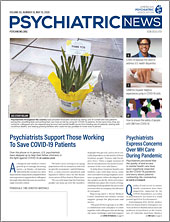Numerous studies have suggested that patients with longer periods of untreated psychosis tend to fare worse than those who begin treatment earlier. Some evidence suggests this may be because longer duration of untreated psychosis (DUP) leads to irreversible damage to neurons; other research suggests people with longer DUP may have a more severe form of schizophrenia.
The authors of a study in the American Journal of Psychiatry have proposed an alternative reason why those with longer DUP may have worse long-term outcomes than those with a shorter DUP: Their illness may be more advanced.
“Studies that assess outcomes for a short period after first admission [for psychosis] may identify protective effects of early diagnosis or treatment that actually reflect differences in illness stage rather than changes in illness course,” wrote Katherine Jonas, Ph.D., senior postdoctoral fellow and research assistant professor in the Department of Psychiatry at the Renaissance School of Medicine at Stony Brook University, and colleagues.
The study suggests that future research on the course of illness in schizophrenia should examine outcomes relative to the first clear symptom of psychosis, as well as when the individual initially receives treatment.
Jonas and colleagues studied data from the Suffolk County Mental Health Project, which recruited hundreds of individuals with their first episode of psychosis between 1989 and 1995. A total of 287 of these patients were later diagnosed with schizophrenia.
Interviews occurred at participants’ first psychiatric hospital admission and again at six months, 24 months, 48 months, 10 years, and 20 years. The researchers assessed participants’ premorbid psychosocial functioning at baseline and after six months. After the first hospitalization, symptoms and functional impairment were assessed using the Global Assessment of Functioning Scale.
The authors defined DUP as the length of time between the onset of the first psychotic symptom and the first psychiatric hospital admission. The date of symptom onset was determined through interviews with the participants and their parents, as well as medical and school records. Participants’ DUP ranged from zero days to 24 years.
DUP was not associated with differences in either premorbid or long-term psychosocial function, the authors wrote. Patients with long and short DUP experienced declines in functioning, but most of the declines experienced by patients with long DUP occurred prior to their first hospital admission, while declines experienced by patients with shorter DUP occurred after their first admission.
“In this way, lead-time bias [in which early detection appears to improve outcomes] creates the illusion of a treatment effect attributable to early intervention,” the authors wrote.
The findings show that researchers should think about lead-time bias in their studies, either in the study design or in the interpretation of the results, explained study co-author Laura J. Fochtmann, M.D., distinguished service professor of psychiatry at Stony Brook University and the medical editor of APA’s clinical practice guidelines. “We want to give patients treatments that are truly going to be effective,” she said. “This speaks to the rigorousness needed in study designs.”
The researchers emphasized that the results should not be interpreted as evidence that early intervention is ineffective or that schizophrenia results in an inevitable decline.
“Some of our participants were untreated for a year or two years, and had negative things happen to them in those years,” Jonas explained. “Some dropped out of school. Even if early treatment doesn’t mean that at some future point they’ll be better off, it might still avert some of those negative consequences associated with going untreated.”
William Carpenter, M.D., agreed, noting that a patient’s social pathology is quite different from psychotic symptoms. Carpenter is a professor at the University of Maryland School of Medicine and the Maryland Psychiatric Research Center, and editor-in-chief of Schizophrenia Bulletin. “Even if early treatment of positive psychotic symptoms does not affect long-term course, early intervention may help patients in relation to social impairments if intervention precedes a breakdown in social and occupational function,” he said.
In an accompanying editorial, Donald C. Goff, M.D., a professor of psychiatry at New York University, and colleagues, called the report by Jonas and colleagues a “valuable and provocative new perspective on the relationship between duration of untreated psychosis and clinical course in schizophrenia.”
They noted, however, that “the great heterogeneity in symptoms and clinical course” of schizophrenia complicates research of the illness. “Until we better understand the biological and environmental factors that moderate clinical course, we must exercise caution in making predictions about prognosis or decisions about optimal treatment approaches based on the analysis of heterogeneous populations,” Goff and colleagues wrote.
“The current focus of research and allocation of clinical resources to the early stages of illness may have minimal impact on the dispiriting downward trajectory identified by Jonas and colleagues, unless late-stage deterioration is also addressed and high-quality treatment is provided beyond the early years of illness,” they continued. “Although the potential relationships of DUP, early intervention, and longer-term outcomes remain unclear, Jonas and colleagues have called attention both to a potential bias in current analytic approaches to the study of DUP and to the importance of considering the long-term course of illness when evaluating interventions that we hope will change the trajectory of illness.” ■
“Lead-Time Bias Confounds Association Between Duration of Untreated Psychosis and Illness Course in Schizophrenia” is posted
here.
“Does Early Intervention Improve the Long-Term Course of Schizophrenia?” is posted
here.

